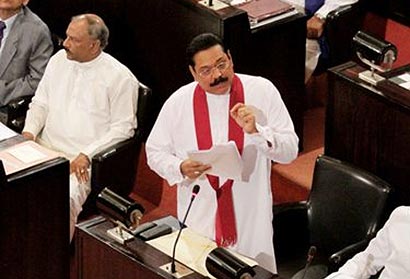Opposition should co-operate with govt. for people’s sake – President

FILE PHOTO –
President Mahinda Rajapaksa yesterday told Parliament that the need of the hour was to form a broad alliance comprising both, the government and opposition to develop the country for the sake of people.
President Rajapaksa, in his capacity as the minister of finance, delivering the reply speech of the debate, on budget 2014, last evening, said the government and the opposition should debate and deliberate the matters pertaining to the development of the country that had practical value.
“We should not permit the recurrence of calamities such as the terrorism that bruised, battered and bloodied this nation for 30 years. We should dedicate ourselves to bring about reconciliation that would bring about national harmony. That great aim could not be achieved by attacking each other and finding each other’s faults. We should unite for the sake of development of this country. The budget 2014 was prepared as a practical plan that could obtain the practical contribution of all whether they be from the government or opposition,” he said.
The President said that for the problems prevailing in society could not be solved by importing solutions from abroad. “Instead we should get together and bring about solutions that would be emulated by other nations. For this purpose, I invite those under the leadership of MP R. Sampanthan, in Parliament and others under the leadership of Chief Minister Vigneswaran, in the Northern Provincial Council, to join hands with us to find our own indigenous solutions to the problems we have.”
The President invited the opposition members to join hands and work in the manner of Colombo Municipal Council where the ruling party and opposition work together to develop the country.
President Rajapaksa said that not only the government rankers but also the opposition members of parliament had appreciated the budget 2014. “Dr Harsha de Silva had pointed out that the budget deficit that had been 9.9 percent of the national income had been reduced to 5.8 percent in the budget 2014. He had also praised the budget mid-term plan targeting to reduce this value further to 5.2 percent next year and reaching 3.8 percent in 2016.”
The President said the Leader of the Opposition had made statements condemning the government obtaining foreign loans. The incumbent government’s budgetary policies are different from its predecessors. After 2005 the government maintained a budget deficit while spending at least 06 percent of the national income to develop country’s infrastructure. The debt had declined to 75 percent of GDP under the incumbent government from 104 percent in previous governments.
“Some have said that per capita income had reached Rs 300,000. The per capita income had increased to Rs 400,000. The per capita income had increased more rapidly than the per capita debt.”
The government never privatised State enterprises. It had paid compensation for insurance, gas and Sri Lanka Broadcasting Corporation after acquiring them. The government never pruned down the State sector but increased the number of workers by about 700,000. We re-established the right for pensions, widened the welfare facilities such as education and health care.
Since 1977 it was the habit of all governments to sell off the loss incurring State enterprises. This was the case with all governments from 1977 to 2005. There was a race between those governments to privatise. The policy that the government should distance itself from those enterprises could be seen in the governments of President J. R. Jayewardene and President R. Premadasa. Their successor President Chandrika Bandaranayake and Prime Minister Ranil Wickremesinghe too followed this policy.
The UNP that came to power in 2002 did not recruit people to the government sector. MP Sajith Premadasa, who was the Deputy Health Minister, could not recruit even a single doctor, nurse or a labourer for a hospital then. That government did not recruit at least a single graduate. That government’s method of reducing the budget deficit was to stop recruiting and pruning down salaries and pensions. Since 2006, our government re-introduced pension for all public sector employees and increased the number of public sector workers from 600,000 in 2004 to 1,300,000. We have recruited about 100,000 graduates to government service,” the President said.
(Courtesy: The Island)
Latest Headlines in Sri Lanka
- Sri Lanka’s Motor Traffic Department records highest-ever monthly revenue February 5, 2026
- Sri Lanka opens applications for graduate teacher recruitment exam February 5, 2026
- Sri Lanka President says true independence lies in economic freedom, unity February 4, 2026
- Sri Lanka grants special presidential pardon to 49 inmates February 4, 2026
- President Anura Kumara Dissanayake’s 78th National Independence Day message February 4, 2026


